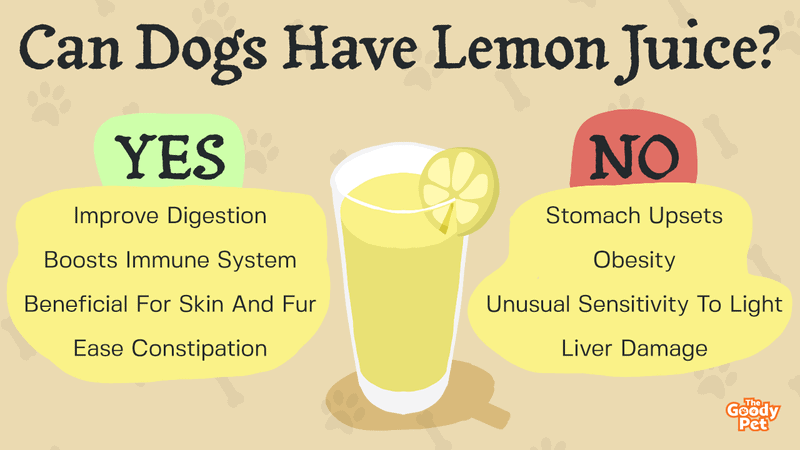Most people feed their dogs the food that they eat. One main thing in this category is lemon juice. Many recipes include lemon juice because it gives the food a nice tart flavor, which many people enjoy. Dog owners looking for different ways to incorporate lemon juice into dog food wonder if dogs can have lemon juice.
Lemons contain flavonoids, which are antioxidants. Antioxidants are substances that prevent or slow the damage to cells caused by reactive oxygen. Lemons also have a particular acidity that can be dangerous to dogs.
In most cases, lemon juice can be dangerous for dogs to ingest because of its acidity. It can also upset dogs’ stomachs as it is a different flavor than the regular foods that most dogs are used to. Moreover, most people will agree that giving a small amount of lemon juice in small quantities is fine for dogs.
Still, it is crucial to monitor the dog’s reaction and ensure no adverse effects. Stay tuned to know the benefits and harmful effects of lemon juice on dogs!
What Does Lemon Juice Do For Dogs?

Lemon juice helps flush out toxins from the body, which is especially beneficial for dogs that suffer from arthritis.
There are many benefits that lemon juice brings about in dogs.
Healthy Digestive System
Lemon juice is rich in vitamin C and helps maintain a healthy digestive system. It helps keep illnesses at bay and also helps with weight management.
Boosts Immune System
Lemon juice helps boost the immune system, so it is beneficial for older dogs. It contains lots of antioxidants that can help fight disease and infections. It is also rich in potassium which can help to lower blood pressure and help keep the immune system healthy.
It also has a numbing effect on the gums and can help heal minor wounds. In Chinese medicine, lemon juice detoxifies the body by flushing out the toxins.
Beneficial For Skin And Fur
Lemon juice helps to give a good coat on the skin and is known to help with fleas. It can also be used on dogs with sensitive skin to help remove any irritations.
Other Health Benefits
Lemon juice also contains limonene, an antioxidant that protects against cancer-causing chemicals. It is also an antibacterial agent that can help to improve digestion and ease constipation.
Can Dogs Have Lemon Juice In Baby Food?

No, dogs cannot have lemon juice in baby food as it will ruin the nutritional value of other ingredients.
Lemon juice and citric acid are common additives in many infant foods to prolong their shelf life. However, these additives are bad for dogs because their presence impacts the nutritional value dogs can have.
Moreover, it turns out that both lemon juice and citric acid can affect the pH levels in a dog’s body. If this is true, then why do baby food manufacturers use these ingredients?
Some people believe citric acid and lemon juice can destroy harmful bacteria such as Salmonella, Listeria, and Escherichia coli while also inhibiting the growth of mold and yeast.
One thing to consider is that some dogs are likely more sensitive than others, so the results may vary. But there were many cases of severe illnesses and even death related to the regular consumption of lemon juice or citric acid.
So, if you buy baby food at the store that has lemon juice already in it, then avoid feeding this to your dog. They might not like that particular flavor and won’t eat much of their regular food if it is mixed in.
There are other reasons why giving a dog lemon juice can be harmful.
Stomach Upsets
One of the most common problems arises from a dog’s inability to break down the acid in lemon juice. It means that the acid in the lemon juice can damage a dog’s kidneys and upset its stomach, leading to higher chances of developing diarrhea, vomiting, or both.
Obesity
If you give lemon juice with a high amount of sugar to your pup, it will get obese even with a moderate amount. In the case of store-bought lemon juice, there is artificial sugar in it, which is harmful to your pup.
So, if you don’t want to compromise your dog’s health, you have to avoid giving it store lemon juice.
Unusual Sensitivity To Light
Additionally, the acid in lemon juice can cause a dog to become more sensitive to light due to its propensity for damaging an animal’s cornea cells. It can lead to ulcers developing over time.
Liver Damage
Finally, the citric acid in lemon juice is toxic to a dog’s liver cells. It means that giving dogs lemon juice can damage the liver over time if the dog consumes it in regular doses.
Is Lemon Juice Safe For Dogs’ Skin?

Lemon juice is not safe to be applied onto dogs’ skin. Besides the acidity factor, lemon juice can cause problems for dogs through skin irritation due to the presence of psoralen.
Although psoralen is a phototoxic compound that causes dermatitis chemically induced by exposure to the sun, it is often used to treat skin disorders in dogs under careful administration. Hence, it is not a great idea to apply lemon juice to your dog’s skin.
In addition, dogs might ingest some lemon juice just by licking the applied area because it is relieving the itch or it just smells good. If this happens, dogs could suffer from nausea or vomiting.
Also, many people have a habit of giving their dogs lemon juice for several reasons, including the belief that it is suitable for a dog’s coat and digestive system. However, lemon juice can actually have harmful effects or toxicity on dogs due to its unique biology.
How Long Does Lemon Toxicity Last In Dogs?
Duration of lemon toxicity lasts according to the amount ingested and other circumstances (e.g., presence or absence of vomiting). Clinical signs may appear within several hours after ingestion, but they will be noticeable after 24 hours.
Lemon juice is toxic to dogs. If a dog has consumed large amounts of lemon juice, it may experience vomiting, diarrhea, depression, anorexia, and tremors. These symptoms typically resolve without any treatment other than to let the dog rest and drink lots of water.
IV Fluid Therapy
If your dog is dealing with depression and cannot drink enough water, the vet will recommend intravenous (IV) fluid therapy to prevent dehydration. If the dog experiences difficulty breathing or has a high heart rate, the vet will also use an IV catheter to provide intravenous fluid support.

Activated Charcoal
Your veterinarian may orally administer activated charcoal to the dog as part of the treatment process. The vet typically administers this substance every four to six hours until the dog’s symptoms improve.
Symptomatic Treatment
Your veterinarian may also suggest symptomatic treatment with anti-nausea medication. The vet will do blood work to assess the dog’s kidney and liver function, as well as its electrolyte levels.





